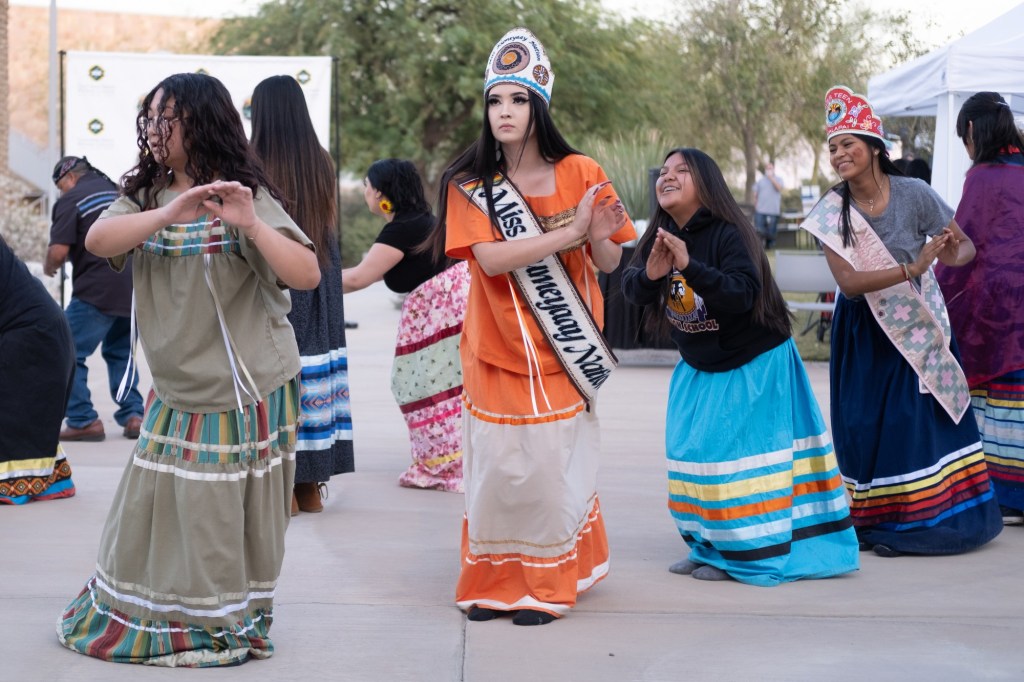More than 1.4 million Californians identify as American Indian or Alaskan Native, according to the 2020 U.S. Census.
But unlike states with smaller Native populations, there’s no nationally accredited tribal college or university to serve Native Americans and help them learn about and within their culture — something that American education has historically fought against.
On Friday, July 18, Assemblymember James Ramos, D-San Bernardino, helped the Palm Desert-based California Indian Nations College move $10 million closer to accreditation.
The state money “shows the commitment from the State of California towards California’s first people, this nation’s first people,” said Ramos, the first California Native American elected to the state legislature.
Ramos presented an oversized ceremonial check to college officials at the Agua Caliente Cultural Museum on Friday.
“This funding marks a historic milestone for American Indian higher education,” college President Celeste Townsend said. “And this moment reflects both a necessity and a promise of a long-overdue investment in our Native American and Indigenous communities.”
Tribal colleges and universities are a federally designated category of higher education institution, which are controlled and operated by federally recognized tribes.
The money is not just a symbolic act, according to Townsend.

“TCUs across the nation have proven their power to uplift communities, honor cultural knowledge and foster student success,” she said. “The absence of a tribal college in California meant our students were left without a place that truly honored who they are. … Now native and non-native students have a place to pursue their academic goals in a space that is respectful and rooted in cultural values that sustain our First Peoples.”
According to the college, the high school graduation rate for American Indians in California is 11.4% lower than the statewide average and American Indians are 14.4% less likely to attend college. Native American University of California and California State University students are also 11% less likely to graduate.
“Many of us are first-generation college students and many of us are native students who never expected to be in space like this,” said Associated Students of CINC President Erica Munoz.
The state funding Ramos presented to the college Friday is more than “just dollars,” she said.
“It’s dignity, it’s belonging, it’s hope for all and for all to come,” Munoz said.
Native students at tribal-accredited colleges have better educational outcomes than at traditional colleges and universities, according to Townsend.
“And they remind every student that they matter, that they are seen, and that they are capable of greatness,” she said.
The college started offering classes in fall 2018 and graduated its first four students in 2019. On May 29, it graduated its largest class to date — 26 students.
The college leases space at two Palm Desert campuses, College of the Desert and UC Riverside Palm Desert. It offers online and hybrid classes so students from throughout California and the country can attend.
It receives no ongoing state or federal funds. Instead, the college has received most of its funding from Inland Empire tribes, including the Twenty-Nine Palms Band of Mission Indians, the Yuhaaviatam of San Manuel Nation (formerly the San Manuel Band of Mission Indians) and the Morongo Band of Mission Indians.
In 2022, Ramos and Assemblymember Eduardo Garcia, D-Coachella, helped the college secure $5 million in state funding for the accreditation process. The Accrediting Commission for Community and Junior Colleges granted candidacy — or pre-accreditation — status to the college in January, according to the school.
“Here in the state of California, we have the most (Native) population, yet we don’t have even have one” accredited tribal college, Ramos said.
In contrast, Oklahoma, which has a third of the Native population, has three accredited tribal colleges.
“But with the state’s involvement, and the tribal communities, and the tenacity and resilience of our people, we’re going to see it become reality,” Ramos said.
California Indian Nations College wouldn’t be the first accredited tribal college in California.
Deganawidah-Quetzalcoatl University in Davis, lost its accreditation and stopped offering a full-time class schedule in 2005.



